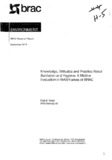Knowledge, attitudes and practice about sanitation and hygiene: a midline evaluation in WASH areas of BRAC
Citation
Rabbi, S. E., & Ali, A. M. (2010, September). Knowledge, attitudes and practice about sanitation and hygiene: a midline evaluation in WASH areas of BRAC. Research Reports (2010): Health Studies, Vol - XLII, 119–139.Abstract
This study aimed to evaluate the impact of BRAC WASH (Water, Sanitation and
Hygiene) programme on hygiene knowledge and practice of the people in intervention
areas compared to baseline status. A population-based cross-sectional study with a
pre-test and post-test design was conducted in 50 sub-districts of rural Bangladesh
where BRAC WASH programme exists. A two-stage systematic sampling design was
followed in drawing the sample. Data collection took place during November 2006-
June 2007 at baseline and April-June 2009 at midline using a pre-tested structured
questionnaire and physical verification. Findings reveal that knowledge and practice of
hand washing at critical times (such as after contact with feaces and waste, before
eating, cooking and serving food) significantly increased at midline compared to
baseline. Knowledge about water contamination and water-borne diseases, water
purification procedure, sanitation hygiene, rules of maintaining good health, and waste
disposal at fixed place increased at midline. Availability of slippers, soap and water
nearby latrine increased in intervention areas. However, there still exists room for
improvement because practice of hygiene behaviour was not universal although they
had knowledge of its importance. To achieve the targets of Millennium Development
Goal, the WASH programme needs to pay more attention in providing knowledge
related to personal hygiene.

